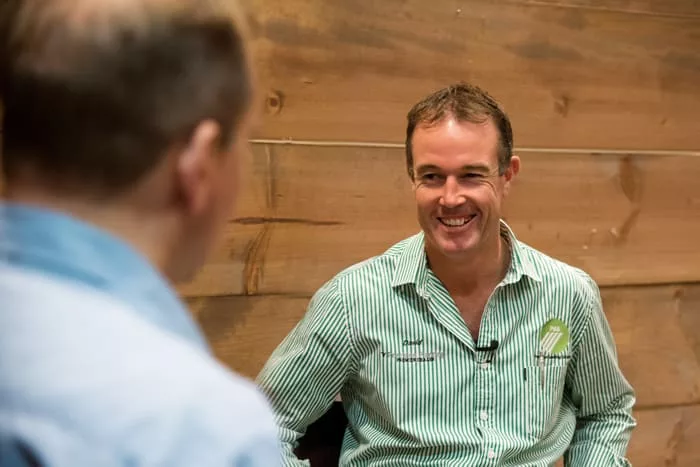Even as precision farming becomes more specialized, it’s also become increasingly global, as dealers from around the world can draw on each other’s expertise and experience to troubleshoot and problem-solve. While customer adoption and product availability can differ depending on the regional need, the ability to network — even face-to-face more than 9,000 miles from home — can be an invaluable resource for David McGavin, founder of Precision Seeding Solutions, an independent dealership in New South Wales, Australia.
At the 2019 Precision Farming Dealer Summit, we had a chance to sit down with McGavin for the first installment in our new Talking Technology series where our editors sit down for a candid conversation on developing sub-dealers, both the productivity gains and potential pitfalls.
David McGavin: Australia is a pretty big country, so once we started to get customers spread out farther, we took on subdealers and most were people that had been recommended to us by farmers. We’ve got about seven now, and that stretches us pretty much right across the east coast of Australia.
Jack Zemlicka: That’s an interesting dynamic, whether you’re talking about North America or overseas, the concept of subdealers. Talk a little bit about how that relationship works for your dealership?
McGavin: When we call them sub-dealers, they’re actually more like business partners. They don’t work for us. They’re selling equipment for us, but we know every one of their customers. That’s probably what’s unique. We’re not just a warehouse that’s boxing up equipment and sending it out to them. Every one of their customers would know me, and probably half or two-thirds have spoken to me, or called me if there’s an issue. We work hand-in-hand together, but we don’t directly employ them.
For a bit of a background on what we do, we loan the equipment rights through to the farmer. We’re wearing a bit of the cost to help our subdealers out, and that helps them run a fairly profitable business. We’ve got a vested interest to make sure all the customers are happy, not just the ones we’re servicing in our immediate area.
Zemlicka: The arrangement likely allows you to diversify your service, and be a bit more specialized.
McGavin: It certainly does. It’s handy. All of us have got our own special techniques. We’ve got a customer who is the only cotton grower that’s amongst us, so we’ve got that expertise. Our newest subdealer, he’s actually an independent Trimble dealer, so that’s giving us a little bit of an advantage there, if we get stuck and we’re fitting some Precision Planting systems. Where one of us lacks, someone else will pick up the slack.
Zemlicka: A big part of precision service is the specialization, but also the flexibility and being able to problem solve, troubleshoot almost anything that comes your way. How have you been able to develop personnel, whether it’s internally or partners to further your business?
McGavin: In Australia there’s no university or college which offers an apprenticeship in precision ag. For us, we look for someone that’s got a keen interest in technology — maybe a farmer’s son or an older electrician. I won’t say they’re out there everywhere, but we want someone who can be a part-time salespeople, too because they will be the face of our business while they’re out there fixing someone’s equipment.
Zemlicka: Where are you looking to develop your business, in the next year or event beyond?
McGavin: Honestly, we want to get back to where we were 6 years ago, in some ways. When we started up it was really easy to service 20 or 30 customers well when that’s all we had. But as we’ve grown, we’ve got more and more customers, and less and less time for those customers. By the same token, we’re doing enough business now that it allows us to expand and we need to be more efficient with service platforms to get back to where we were when we only had a handful of staff. We’ve just added a new manager who is going to take over a lot of what I’ve been doing, and I’m going to be able to focus on the broader support side. We’ve got a 3-4 month period where we’re the busiest, and that’s when someone rings me at 9:00 at night, and I need to be able to answer the call.







